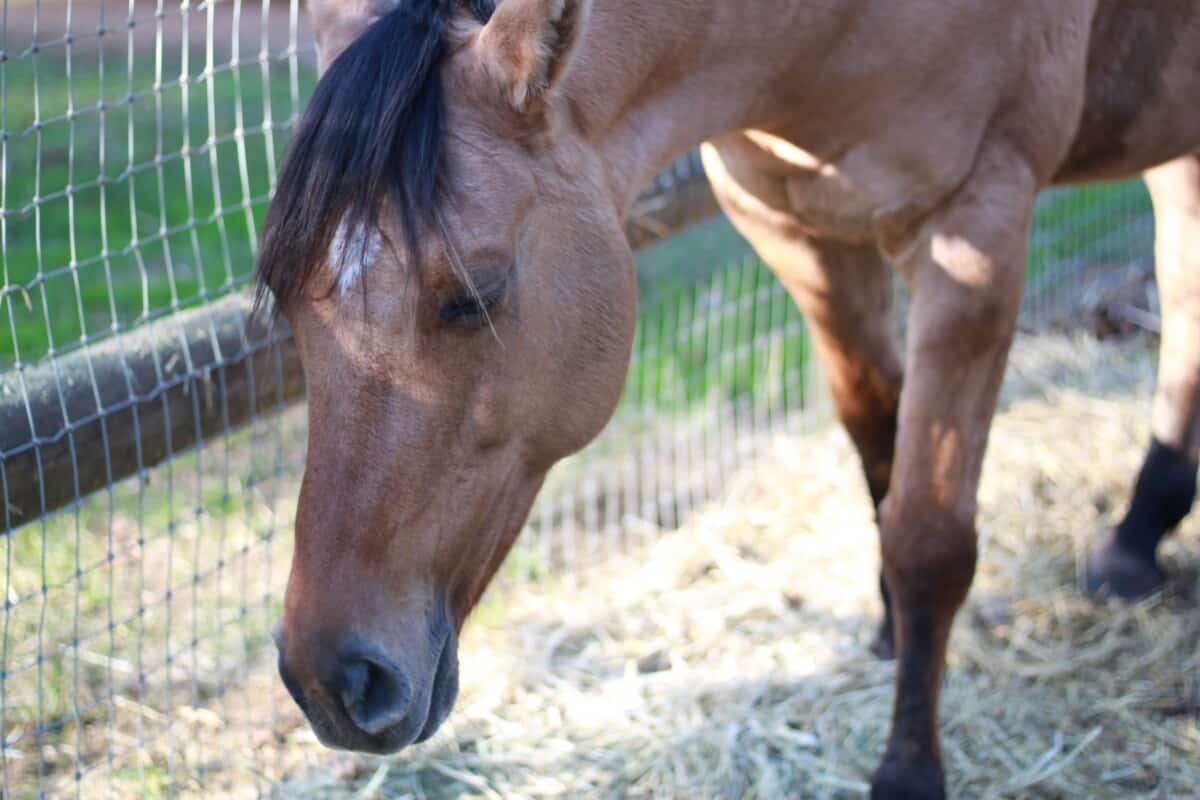
Water and horses. Do they really mix? Based on the tiptoeing and disgruntled looks horses have given me when asked to step through the smallest of rain puddles, I think it’s a perfectly valid question! Here is what you need to know about horses and swimming.
Can horses really swim? Horses naturally know how to swim, and they move their legs similar to trotting to advance in the water. Swimming is an excellent aerobic exercise for horses and can be done recreationally but also for fitness and rehabilitation purposes to build or rebuild muscle mass and strengthen tendons.
How do Horses Swim?
Horses, like many other mammals, have a natural instinct to swim when in deep water. It is believed that this capability stems the days when they lived in the wild, and when crossing rivers was necessary to escape dangers or reach new pastures. It was simply a part of their natural movements in nature.
When a horse is submerged in water, it’s body will stay afloat as long as it keeps forward momentum and it will instinctively lift its head over the surface to breathe. The legs will typically move in a paddle-like manner to maintain balance and stability in the water.
Because of the natural resistance water provides, swimming is physically tiring for a horse and it is common for them to breathe heavily during this type of exercise. In the video below you can see how a horse typically moves and breathes while swimming.
It is important to be aware that horses cannot hold their breath in the same way we can. This means that if the horse’s head ends up under water, the danger of drowning is quite high. Therefore, it is important not to rush the process of getting a horse accustomed to water and swimming. Because of the particular anatomy of horse ears where there is no lower passage that water can drain through, it is important to avoid water getting into this cavity as it could cause discomfort or even lead to an ear infection.
Do Horses Like to Swim or Are They Afraid of Water?

Horses are individuals, just like us, and even if they have a natural instinct to swim when they get into deep water, this doesn’t necessarily mean they like it. Comfort-levels vary from horse to horse. Some will happily wade straight in, while others will be skeptical and nervous. It can take a lot of time and patience to habituate a horse to swimming.
These are a few reasons why some horses might be afraid of water.
- Horses have a limited field of depth perception, which means wading into water is basically like walking into the complete unknown. And that’s pretty scary!
- Some horses may have had a bad experience with water in the past and therefore associate it with something negative.
- They simply dislike the feeling of being wet. Just like certain dogs, cats or other animals, some horses just don’t like being wet. Frustrating? Yes!
Insider Tip
It is certainly possible to help a horse go from a trembling wreck when approaching water to a poised superhero that fearlessly takes on the sea! The trick is to take incremental but consistent steps to habituate the horse to water in a setting that is already familiar and safe, and showing them that it is not dangerous. Allow him to get familiar with the sensations such as the feeling of getting wet, the sound of waves, the smell of the ocean and other sensory experiences related to water. Building confidence slowly is key.
Is Swimming Good for Horses?
Swimming has many benefits for horses, which is why it is often used for training and rehabilitation purposes.
Rehabilitation
Swimming is an excellent way to keep a horse in shape whilst rebuilding and toning muscles and strengthening tendons after an injury, without the horse having to carry their weight. Therefore, swimming in equine pools is often included in many physiotherapy regimes.
Training
As it is for humans, swimming is an aerobic exercise so a great way to build endurance and stamina for horses. Regular swimming activity will allow the horse to strengthen both the heart and lungs.
Due to the way horses move in the water, swimming will help increase the limb’s range of motion. This can in turn help increase flexibility and stride, which is highly desirable in many equestrian sports. One thing to keep in mind about swimming as part of a training regime is that it also works muscles typically undesirable for horses used in competitive sports, such as the muscles used to keep the head up and over water. However, this is only an issue if swimming is the predominant or only activity the horse is engaged in.
Recreational
Swimming is also a fun activity to break up a trail ride on a hot summer day! If you feel confident with your horse and you know how it responds to water, we can highly recommend this!
Can Horses Swim in the Ocean?
Horses can swim in the ocean and swimming with your horse is one of those things that can be an amazing experience, but that can also quickly go very wrong. Here are a few things to consider before taking the plunge so to speak.
- How deep is the water? Is there an even angle or is there a drop?
- What is the condition of the seafloor? Is it sand, stones, coral, etc.? Consider that hard and uneven surfaces may hurt the horse’s legs while swimming.
- Are there waves? Remember that horses cannot hold their breath so don’t swim in the sea if the waves are large enough to wash over their heads.
- Is the current strong? If it is, stay on land or only tip the feet. It can still be a refreshing break for you both!
- Check your surroundings. Are you disturbing others on the beach or in the area? Are people bathing there? Be considerate of others.
- Rules and regulations. Are horses allowed, and are they allowed in the water? Many public beaches will have restrictions so make sure you pay attention to relevant signage.
- Remove the saddle and consider a bit less bridle. Make sure you remove ANY equipment that restricts the upward movement of the head as the horse needs free rein to hold it over the surface to breathe.
We would not recommend going swimming with your horse alone. Firstly, it is safer to be two or more in case anything was to happen. Secondly, as horses are herd animals, it is easier to convince a hesitant horse to go into the water if it can follow another one.
Can You Ride a Horse While It Swims?
It is ok to ride a horse while it swims and it’s exciting to feel its power advancing through the water. Still, we need to keep in mind that this is not his natural element and it is important to not hinder his movements and avoid getting in the way. To do this, make sure you are not pulling on the rains (if you opt to keep the bridle on). If you need to hold on to something, then grab the mane for support.
Swimming is tiring for horses so try to pay attention to your horse and get out of the water while it still has good energy levels. Reward him with some snacks and a rest in the shade once you finish.
A final insider tip
Many horses will want to roll either before (less common) or after (very common) swimming and it can sometimes come as a bit of a surprise! If your horse starts digging repeatedly in the ground with its hoof while lowering his head, that is a pretty clear sign of what’s to come. To stop him from laying down (if you are still mounted), just bring his head back up and move the horse forward by squeezing your legs to its sides.
If you have other tips around horses and swimming, leave them below. We’d love to hear them!
This article is accurate and true to the best of the author’s knowledge. It is not meant to substitute diagnosis, prognosis, treatment or any type of medical advice for humans or horses. Animals exhibiting signs and symptoms of distress should be seen by a veterinarian immediately.


